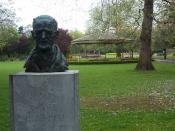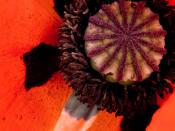"Victims of Hospitality": Joyce, Colonialism and the Question of Strangers in Dubliners Dipanjan Maitra Jadavpur University, Kolkata, India
Abstract The paper attempts to interrogate the ambivalence intrinsic to the 'Irish turn' in Joyce scholarship understood not only as a belated 'homecoming' of the 'high modernist' apolitical exile but also as an act of 'reclaiming' on the part of Irish Joyceans. By exploring Joyce's critical writings on Irish politics the essay tries to examine the role of strangers and the theme of hospitality in Joyce's fiction especially Dubliners (1914) to bring into focus Joyce's understanding of the notion of 'hospitality' to further explore the concepts of 'foreign-ness' and thereby of an essential 'Irish-ness' as well.
Key words: James Joyce, Dubliners, colonialism, hospitality, strangers.]
I. 'Semicolonial' Joyce
The 1990s witnessed an 'Irish turn' in Joycean criticism. It is true that Colin McCabe's classic James Joyce: New Perspectives or the earlier Revolution of the Word had already contained essays by prominent Irish Joyce scholars, but it was definitely with the publication of works like Vincent Cheng's Joyce, Race and Empire or Enda Duffy's Subaltern Ulysses or Emer Nolan's James Joyce and Nationalism that Joyce's position as a major postcolonial wrier was established. Towering over these was Declan Kiberd's monumental Inventing Ireland. Kiberd's edition of the Penguin Ulysses was accompanied by Terence Brown's edition of A Portrait. The very title of a work like Our Joyce suggests that a certain 'reclaiming' is taking place in Joycean studies. Long before Joyce had 'returned' to Ireland by a commodius vicus of recirculation, Joyce's reputation as one of the giants of Modernist fiction was firmly established in America or France thanks to the efforts of scholars like Richard Ellmann, Hugh Kenner, Harry Levin, Valéry Larbaud and of course Jacques Aubert. By the time Julia Kristeva commented...


